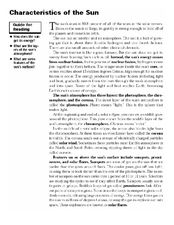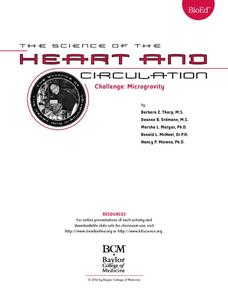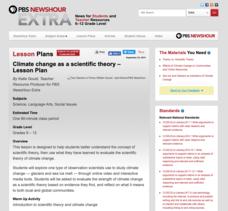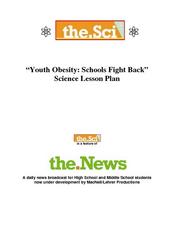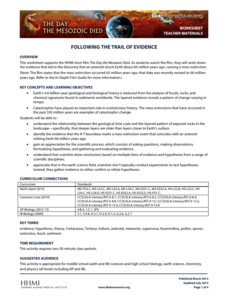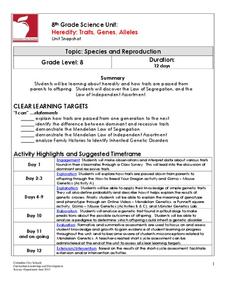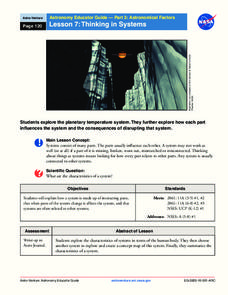Rice University
Characteristics of Inner Planets
Aspiring astronomers assess the inner planets using this handout. They read about the characteristics of each, noting that all four of them have rocky surfaces. Rotation and revolution are introduced, including Venus' retrograde...
Rice University
Characteristics of the Sun
After reading about how the sun gets its energy, and about the layers and features of the sun's atmosphere, heliologists complete a comprehension worksheet. On it, they label features on a diagram of the sun and match terms from the...
Baylor College
Challenge: Microgravity
What a festive way to examine what happens to the heart in different gravitational situations! Small groups place a water-filled balloon in different locations (on a table top, in a tub of water, and held in a vertical position), drawing...
PBS
Climate Change as a Scientific Theory
Get your class thinking about climate change as a scientific theory. Guided by a handout, emerging earth scientists read articles and take notes about glaciers and sea ice. To conclude, they write an evaluation of the evidence for...
Curated OER
Youth Obesity: Schools Fight Back
Explore nutrition and healthy eating habits with a study on youth obesity. Learners watch a PBS documentary on the obesity epidemic which discusses government programs aimed at healthier choices, as well as more localized efforts. Kids...
National Academy of Sciences
Lights at Night Webquest
Help learners find ways to become more efficient energy consumers. To start, individuals research how different countries address energy efficiency and then analyze their own carbon footprint. They use their research to identify ways to...
Cornell Lab of Ornithology
Jump, Glide, or Fly? Exploring Bird Evolution
How have birds evolved from prehistoric animals? With the three-part instructional activity, small groups first research different prehistoric animals and determine whether they are birds. Then, scholars explore different bird...
Howard Hughes Medical Institute
Following the Trail of Evidence
One important skill in analyzing scientific evidence is identifying facts versus opinions. Scholars identify pieces of evidence from the film The Day the Mesozoic Died and then discuss this evidence in small groups at the end of each act...
PBS
Impact Craters on Earth
What does it look like when a meteorite strikes Earth? A slideshow resource gives pupils a firsthand view of common meteorite strikes. Using the ages of the craters, scholars analyze how the shapes erode over time.
Towson University
Looking Backwards, Looking Forward
How do scientists know what Earth's climate was like millions of years ago? Young environmental scholars discover how researchers used proxy data to determine the conditions present before written record. Grouped pupils gain experience...
Polar Trec
Why Can’t I Eat This Fish?
Can turning on the television lead to toxins in the food supply? The lesson offers an opportunity for young scientists to complete guided research. A worksheet lists each question as well as the web page necessary to answer the question....
Polar Trec
Science in Antarctica
PolarTREC brings polar researchers and educators together to benefit both science and education. Pupils select one research project in Antarctica to explore and present to their peers. Scholars polish research and presentation skills as...
NOAA
Fishy Deep-sea Designs!
Oceans represent more than 80 percent of all habitats, yet we know less about them than most other habitats on the planet. The instructor introduces the epipelagic, mesopelagic, bathypelagic, twilight, and midnight zones in the ocean....
Columbus City Schools
Let’s Get Theoretical About Cells
Get up close and personal with cells in a hands-on journey to discover what makes up living things. Scholars learn valuable microscope skills, delve into the Modern Cell Theory, and gain insight into how cells reproduce. The included lab...
Columbus City Schools
What is Up Th-air? — Atmosphere
Air, air, everywhere, but what's in it, and what makes Earth's air so unique and special? Journey through the layers above us to uncover our atmosphere's composition and how it works to make life possible below. Pupils conduct research...
Columbus City Schools
It’s Electric!
Shocking! Who knew so many great ideas existed for teaching middle schoolers about electricity? Find them all within this energetic framework. You'll light up at the variety of printable and web-based resources within! After building...
Columbus City Schools
History Helps When It Comes To Plate Tectonics
Get ready to move, shake, slip, and slide with a well-rounded plate tectonics unit! The engaging resource includes everything you need to inspire eighth grade science scholars, from worksheets to demonstrations. Assess their...
Columbus City Schools
Thinking Like A Soil Scientist
Ready to roll up those sleeves and get your hands dirty? Dirty with soil science content, that is! Overcome those "But it's just dirt" objections with a trip outside to collect soil samples for some in-class analysis. Use the variety of...
Columbus City Schools
Heredity: Traits, Genes, Alleles
If you knew people would pay extra for a bald dragon, could you pick which parents you should breed in order to get the highest number? The unit examines heredity and genetics through breeding dragons, mice, dogs, and tries to figure...
Allegany-Limestone Central School
Plantae WebQuest
Send your young life scientists on a plant webquest that has them reading case studies to decide if seeds are seeds and plants are plants.
Chicago Botanic Garden
Recognizing Change (Observation vs. Inference)
What is the difference between making inferences and making observations? Young climatologists refer to a PowerPoint to make observations on each slide. They record their observations in a provided worksheet before drawing a...
S2tem Centers SC
Seasons
Winter, spring, summer, and fall—take the learning of the seasons beyond the elementary level to the middle school classroom. Curious learners begin by watching videos about the seasons and the rotation of planet Earth. Then, they...
NASA
Astronomy Mission Module
Yes, scientists say, there is other life in our solar system! And the best place to look is on Europa, a moon of Jupiter. Here, learners mimic the techniques scientists use to gather information about objects in our solar system, write...
NASA
Introduction to Astronomy
Welcome to your new job as an astrophysicist, astrobiologist, engineer, or research scientist at NASA. Your job is to search for alien life in our solar system! Throughout a unit of activities, learners search the galaxy through...



